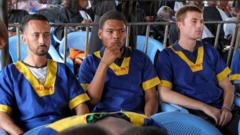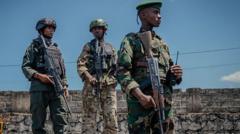The commutation of death sentences for three Americans involved in a coup attempt in the Democratic Republic of Congo follows international diplomatic developments, shedding light on colonial legacies and ongoing conflicts in the region.
Americans' Death Sentences Commuted in Congo Coup Case Amid Diplomatic Developments

Americans' Death Sentences Commuted in Congo Coup Case Amid Diplomatic Developments
Three Americans sentenced to death for a failed coup in the Democratic Republic of Congo have had their sentences commuted to life imprisonment, reflecting diplomatic maneuvering.
The Democratic Republic of Congo (DR Congo) has commuted the death sentences of three Americans involved in an attempted coup last year, reducing their penalties to life imprisonment. The decision was made public by the presidency and comes as U.S. diplomatic engagement in Africa intensifies, highlighted by the upcoming visit of newly appointed senior advisor for Africa, Massad Boulos.
The three convicts—Marcel Malanga, Tyler Thompson, and Benjamin Zalman-Polun—were part of a larger group of 37 individuals sentenced to death by a military court in September. The Americans allegedly orchestrated an assault on the presidential palace and an ally’s residence in May, amidst a political climate fraught with instability. Notably, the attempted coup resulted in the death of the suspected plot leader, Christian Malanga, who had U.S. citizenship but was of Congolese descent.
Despite no formal acknowledgment from the U.S. State Department deeming the trio as wrongfully detained, conversations regarding their case between American and Congolese authorities have reportedly been ongoing. As the situation unfolds, the commuting of their sentences appears to signal a potential shift in relations, coinciding with President Félix Tshisekedi's administration addressing broader security concerns within the military after a moratorium on death sentences was lifted earlier this year.
The court proceedings drew significant attention, with trials broadcast nationwide. Out of 51 individuals tried, 14 were acquitted, indicating varying degrees of culpability associated with the coup attempt. As the American trio remains in legal limbo, it is uncertain whether they will continue serving their sentences in DR Congo or be repatriated under similar accords to others, such as Jean-Jacques Wondo, a dual Congolese-Belgian citizen.
The complex dynamics surrounding this case extend beyond the immediate legal decisions, touching on themes of governance, colonial legacies, and the interplay of international diplomacy in a nation frequently beset by civil strife. As the world watches the developments in Kinshasa, the response from various stakeholders both domestically and internationally will be critical in determining the future trajectory of U.S.-Congo relations.
The three convicts—Marcel Malanga, Tyler Thompson, and Benjamin Zalman-Polun—were part of a larger group of 37 individuals sentenced to death by a military court in September. The Americans allegedly orchestrated an assault on the presidential palace and an ally’s residence in May, amidst a political climate fraught with instability. Notably, the attempted coup resulted in the death of the suspected plot leader, Christian Malanga, who had U.S. citizenship but was of Congolese descent.
Despite no formal acknowledgment from the U.S. State Department deeming the trio as wrongfully detained, conversations regarding their case between American and Congolese authorities have reportedly been ongoing. As the situation unfolds, the commuting of their sentences appears to signal a potential shift in relations, coinciding with President Félix Tshisekedi's administration addressing broader security concerns within the military after a moratorium on death sentences was lifted earlier this year.
The court proceedings drew significant attention, with trials broadcast nationwide. Out of 51 individuals tried, 14 were acquitted, indicating varying degrees of culpability associated with the coup attempt. As the American trio remains in legal limbo, it is uncertain whether they will continue serving their sentences in DR Congo or be repatriated under similar accords to others, such as Jean-Jacques Wondo, a dual Congolese-Belgian citizen.
The complex dynamics surrounding this case extend beyond the immediate legal decisions, touching on themes of governance, colonial legacies, and the interplay of international diplomacy in a nation frequently beset by civil strife. As the world watches the developments in Kinshasa, the response from various stakeholders both domestically and internationally will be critical in determining the future trajectory of U.S.-Congo relations.


















